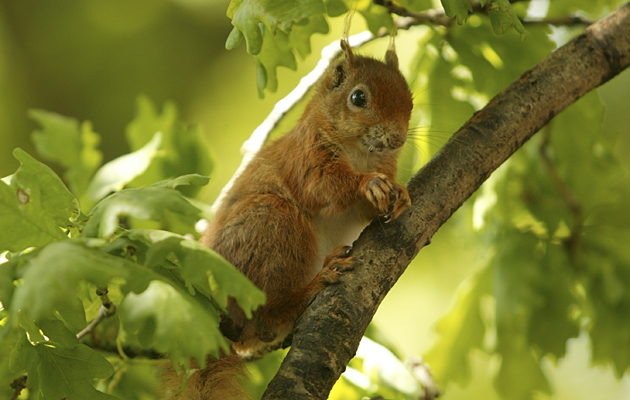Royal backing for red squirrel strategy
Prince Charles has set his seal of approval on an agreement promising protection for red squirrels and sustained action against their grey cousins

A new plan promoting action to protect red squirrels has received the personal approval of Prince Charles, his office has confirmed. The Accord on Squirrels in the United Kingdom sets out a long-term commitment to see “Red squirrel populations protected and thriving and greys controlled through targeted and sustained action”.
The document sets out a resolution to pursue a partnership approach towards managing the UK’s squirrels, combining the efforts, expertise and fundraising capabilities of the public, private and voluntary sectors, building on existing programmes of joint work. It was drawn up at the Prince of Wales’s Scottish estate, Dumfries House, and signed by representatives of Defra, the Scottish Government, the Royal Forestry Society (RFS), the Forestry Commission and the Red Squirrel Survival Trust (RSST), of which the prince is patron.
The move brings some comfort to red squirrel conservation groups and forestry managers two months after the solicitor general announced that the Government no longer considered it feasible to eradicate the UK’s population of grey squirrels (News, 26 March), which pass the squirrelpox virus to reds and compete with them for resources, and have been identified by the RFS as a greater threat to Britain’s broadleaved woodlands than deer or disease (News, 29 January).
Speaking to the Guardian newspaper, chairman of the RSST Charles Kinnoull described a mood of “optimistic determination”.
RFS development director Simon Lloyd said: “Grey squirrels have caused immense damage in woodlands by stripping bark, sometimes killing the trees and often to an extent that few will ever reach their full environmental or timber potential.”
Nick Mason, project manager for Red Squirrels Northern England, told Shooting Times that the accord, and its focus on partnership, is a positive development, particularly at a time when government agencies are re-designing agri-environment schemes and being encouraged to think creatively about how conservation and species management can be incorporated into new strategies.
The Game to Eat campaign, run by the Countryside Alliance, also welcomed the news, a spokesman said: “Grey squirrels are in plentiful supply and the publicity surrounding red squirrel conservation means more and more people are willing to try greys to protect our native reds. Our own Game-to-Eat campaign is there to promote the eating of all wild game and grey squirrel has become a part of that. Eating greys has two benefits – aiding red squirrel conservation and providing a delicious, wild, healthy and cheap meat to the menu.”
Not everyone welcomed the accord: a spokesman for charity Animal Aid said: “Claims that they are trying to ‘save’ the red squirrel is disingenuous as reds are not endangered but are actually plentiful across their range. There are ways to help protect red squirrels. Establishing them on islands, changing forest planting and supplementing their feed could all help the much-loved animal, without harming the greys.”








